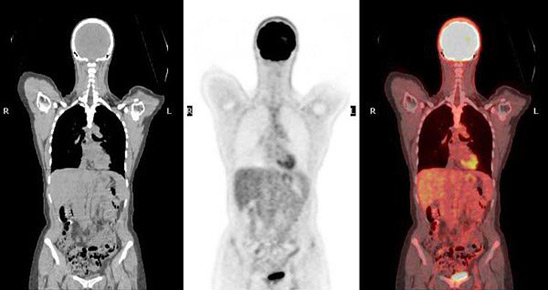Nuclear Medicine

The Clinical Nuclear Medicine section is the reference department for diagnostic and therapeutic application of radionuclides in Brooklyn. University Hospital and Kings County Hospital departments operate conjointly under a Broad Radioactive Material Use License granted to the largest facilities. This license allows rapid introduction of the latest isotopic procedures. Both departments have state-of-art all digital multi-detector gamma cameras and processing computers. The University Hospital department was the first to introduce dedicated multi-slice positron emission tomography (PET) for the patients of Brooklyn, Queens, and Staten Island. The department has full time attending staff who are certified by the American Board of Nuclear Medicine and who oversees the full gamut of routine and investigational diagnostic nuclear medicine in these facilities.
General Comments
All studies (inpatient and outpatient) are performed in nuclear medicine; a control area devoted exclusively to radioisotopes. Non routine studies available only for investigational purpose must be approved and arranged for by the Division Director. Routine studies are performed M-F 8:00 AM to 4:00 PM and must be accompanied by a Nuclear Medicine Consultation Study Request signed by the referring physician. These study requests should indicate specific clinical symptoms and signs as well as other factors as rationale for the requested study. Such clinical information is not only necessary for better interpretation of study results, but is often required to individualize study performance thereby yielding maximum diagnostic information. Attending‘s approval of each study request ensures that all radioisotope patient administration‘s are medically appropriate as determined by such dialogue. Written consents are not necessary for diagnostic scintigraphy. Patient study preparation is generally unnecessary; however, hepatobiliary scans can be less diagnostic in the non-fasted patient. Iodine containing contrast material should be avoided for a minimum of 3 weeks prior to thyroid radioiodine scintigraphy, as should thionamides for 1 week. Women of childbearing age should be questioned as to the possibility of existent pregnancy and scintigraphy deferred unless the clinical illness supercedes risk to fetus.

Basic Facts
Kings County Hospital Center
Site: A-21
Routine Hours: 8:00 AM - 5:00 PM
Monday to Friday
Tel: 718-245-3696
University Hospital at Brooklyn
Site: A2-621
Routine Hours: 8:00 AM - 5:00 PM
Monday to Friday
Tel: 718-270-1632